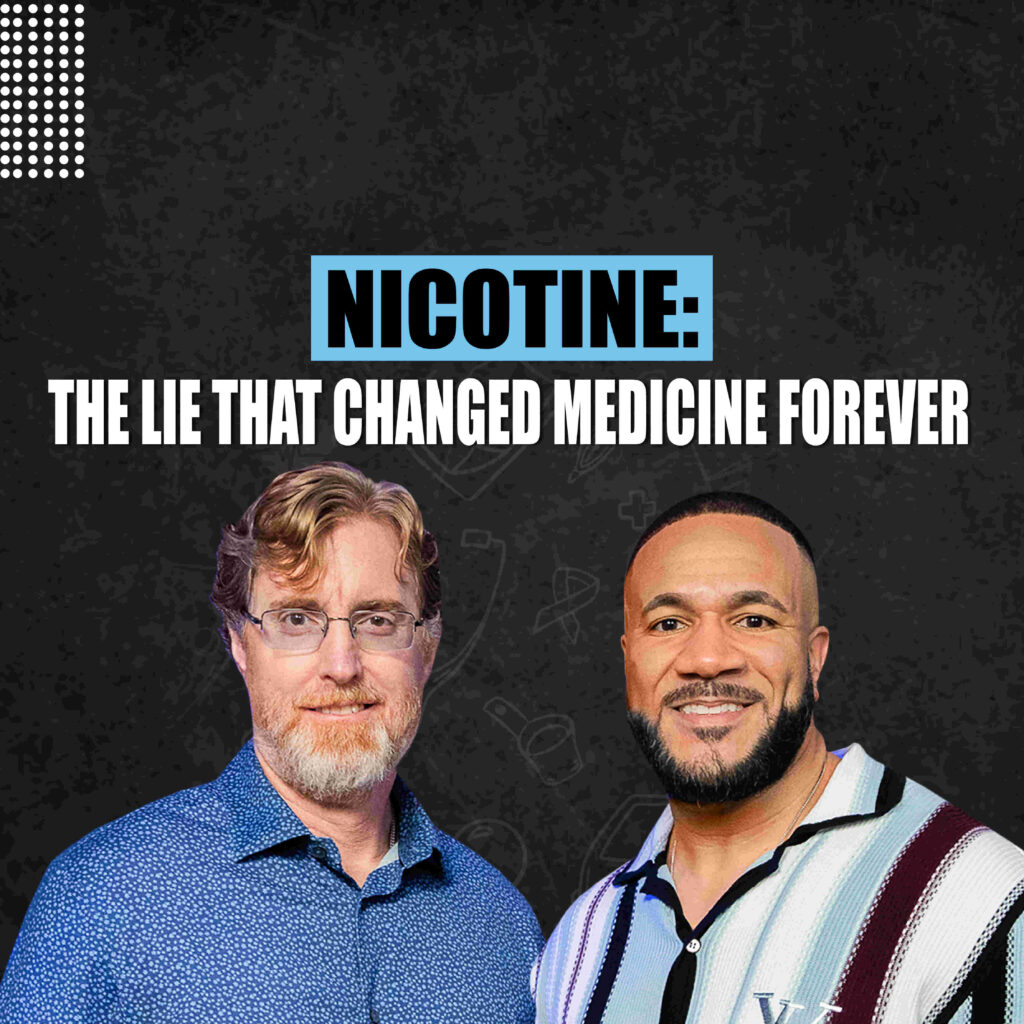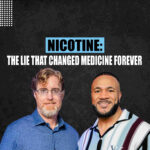Some people find their calling through inspiration. Others find it through heartbreak. For Dr. Bryan Ardis, a former athlete turned chiropractor, acupuncturist, and outspoken health researcher, the journey toward holistic healing began with the latter.
When he joined Sam Tejada, CEO and Founder of Liquivida®, on “A Healthy Point of View” podcast, the conversation wasn’t just about science or controversy; it was about questioning what we’ve been taught to believe about health, medicine, and even nicotine.
Dr. Bryan Ardis EXPOSES the Biggest Medical Lie in History | Ep. 94

From Basketball Dreams to Healing Missions
Dr. Ardis never planned on becoming a doctor. At 21, basketball was his world until the day his 11-year-old sister was diagnosed with lupus. Doctors told his family that she would need medication for the rest of her life, and that the drugs would likely destroy her organs before she reached middle age.
“I looked at my parents and said, ‘I’m not letting that profession kill my sister,’” he recalled. That single moment changed everything.
What followed was a 12-year journey through medical school, holistic studies, and endless research into how the human body heals itself. “She was fine for ten years,” he said. “Then suddenly, everything went wrong, and no one could tell us why. I wanted to find those answers myself.”
The Turning Point
After years of frustration with conventional medicine, including a terrifying incident where his infant son had a seizure following an antibiotic, Dr. Ardis walked away from traditional medical training. He opened his own wellness centers in Tennessee and later Dallas, helping thousands of patients find healing through chiropractic care, acupuncture, and nutrition.
“I just wanted to know if the body could truly heal,” he said. “And what I learned is that it can. The problem is, we’ve been conditioned to think otherwise.”
A System Built on Profit, Not Prevention
During the interview, Dr. Ardis shared his view that modern medicine has strayed far from its original mission. He pointed to a moment in history, the early 1900s, when a document known as the Flexner Report reshaped medical education in the U.S. and Canada, removing holistic and natural healing from the curriculum.
“Before 1910, doctors learned about herbs, diet, acupuncture, all of it,” he explained. “After the Flexner Report, it all disappeared. The focus shifted to pharmaceuticals. And that wasn’t an accident.”
For Dr. Ardis, the system’s priorities are clear: “It’s not about wellness. It’s about profit. The pharmaceutical industry funds the research, writes the textbooks, and influences the policies that decide how doctors are trained.”
Rethinking Nicotine
Then came the subject that most listeners weren’t expecting: nicotine. For decades, the world has associated it with addiction and disease. But according to Dr. Ardis, that narrative isn’t as black and white as it seems.
“The biggest misconception is that nicotine is addictive,” he said. “It’s not the nicotine, it’s the chemicals added to tobacco products.”
He referenced a Harvard study that analyzed millions of research pages from tobacco companies. It revealed that manufacturers began adding a group of chemicals called pyrazines to cigarettes to enhance aroma and, more importantly, to make them more habit-forming.
“If nicotine alone were addictive, people wouldn’t struggle to quit cigarettes after switching to nicotine patches or gum,” he explained. “They crave what was added, not the nicotine itself.”
Nature vs. Industry
Dr. Ardis described a long history of natural compounds being suppressed or demonized once pharmaceutical companies discovered how to synthesize them. He cited the Tonka bean, a plant high in coumarin, which naturally helps prevent blood clots. Just before the synthetic blood thinner Coumadin (Warfarin) was released in the 1950s, Tonka beans were banned in the U.S.
“That’s the pattern,” he said. “They take something nature gives us, make a synthetic copy, and then outlaw the original. It’s been happening for decades, and nicotine is just the latest example.”
In its pure form, he noted, nicotine has shown anti-inflammatory, neuroprotective, and cardiovascular benefits. “It’s not about smoking or vapes,” he added. “It’s about the molecule itself and how it interacts with the body.”
Nicotine, Immunity, and COVID-19
Perhaps the most surprising part of the discussion came when Dr. Ardis described research from France during the early months of the COVID-19 pandemic. Scientists noticed that smokers appeared less likely to be hospitalized or die from the virus. Further genetic analysis suggested that nicotine binds to the same receptors that the virus targets, potentially blocking it from taking hold.
“In April 2020, researchers suggested that giving people nicotine gum or lozenges could have ended the pandemic in two weeks,” he said. “It’s controversial, but the science is there. The problem is, it doesn’t fit the pharmaceutical narrative.”
Some functional medicine doctors are already exploring the idea. “It’s not about promoting smoking,” Dr. Ardis clarified. “It’s about understanding how certain natural compounds might support the body.”
A Call for Curiosity
What made the episode stand out wasn’t just the subject matter; it was the tone of curiosity. Sam and Dr. Ardis weren’t claiming to have all the answers. They were asking the kind of questions that push medicine forward.
“People deserve to understand their options,” Sam said. “If there’s another way to heal, we should be open to it.”
Dr. Ardis agreed. “The human body was designed to heal. Once you start removing what harms it and give it what it needs, recovery happens naturally. The more we learn, the more we realize that health is about energy, balance, and truth, not just prescriptions.”
The Bigger Picture
Whether or not every theory Dr. Ardis presents is universally accepted, one thing is undeniable: his passion for empowering people to think for themselves. His message is less about defying medicine and more about reclaiming ownership of personal health.
As Sam closed the conversation, he summed up the spirit of the episode in one line:
“Health starts when you stop taking everything at face value, and start asking better questions.”

